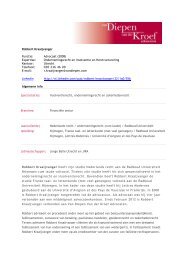© Van Diepen Van der Kroef Advocaten
© Van Diepen Van der Kroef Advocaten
© Van Diepen Van der Kroef Advocaten
- No tags were found...
Create successful ePaper yourself
Turn your PDF publications into a flip-book with our unique Google optimized e-Paper software.
prevent the genocide. Worse still, with that the State of the Netherlands actively botchedthe little military action that was un<strong>der</strong>taken to prevent genocide. Additionally, theobserved war crimes should have been reported, which could have saved many lives. TheUnited Nations and the State of the Netherlands also took it upon themselves to play anactive role in separating the men and the women. It is here repeated that the ICJ has ruledthat for the violation of Article I of the Genocide Convention it is not relevant whether theemployment of all available measures would have prevented the genocide. The Associationet al. here also records again that numerous other violations of human rights occurred. TheAssociation et al. refers to points 412 through 417 of the originating writ of summons.134. In reviewing the question whether there was violation of Article I of the GenocideConvention it is not relevant that the allegedly culpable conduct (alternatively, theallegedly culpable omissions) has (have) occurred prior to the genocide that was committedfrom 13 July 1995. The prevention of genocide is, after all, by definition conduct that occursprior to the commission of the genocide. The ICJ in its ruling of 26 February 2007 held onthis that (see legal consi<strong>der</strong>ation 431):‘(…) a State can be held responsible for breaching the obligation to prevent genocide only ifgenocide was actually committed. (…) This obviously does not mean that the obligation toprevent genocide only comes into being when perpetration of genocide commences; thatwould be absurd, since the whole point of the obligation is to prevent, or attempt toprevent, the occurrence of the act. In fact, a State’s obligation to prevent, and thecorresponding duty to act, arise at the instant that the State learns of, or should normallyhave learned of, the existence of a serious risk that genocide will be committed. From thatmoment onwards, if the State has available to it means likely to have a deterrent effect onthose suspected of preparing genocide, or reasonably suspected of harboring specific intent(dolus specialis), it is un<strong>der</strong> a duty to make such use of these means as the circumstancespermit.’135. The above ruling means that the UN and the State of the Netherlands had to employ allavailable means from the moment that they knew, or should reasonably have known thatgenocide would occur. As has been discussed above and as will be addressed again below,the UN and the State of the Netherlands were from 1993 already aware of the threatenedgenocide. Furthermore, the UN and the State of the Netherlands knew that the BosnianSerbs were continuing to attack the Safe Area and that the objective of the Bosnian Serbs<strong>©</strong> <strong>Van</strong> <strong>Diepen</strong> <strong>Van</strong> <strong>der</strong> <strong>Kroef</strong> <strong>Advocaten</strong> page 60 of 99
















